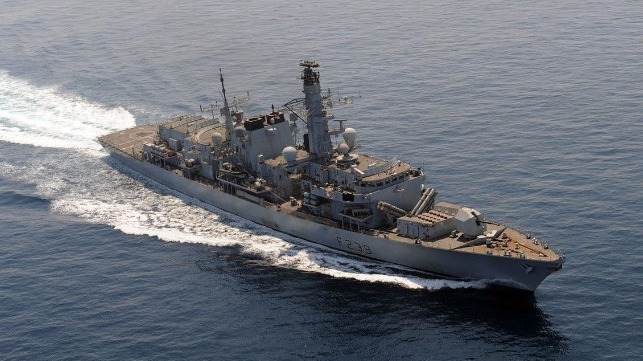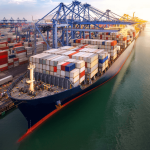On a side mission from her role as an escort for the carrier HMS Queen Elizabeth, the frigate HMS Richmond recently patrolled the East China Sea in search of sanctions-busting activity, according to the UK Ministry of Defence. Consistent with the experiences of Japanese and American patrols, Richmond came back with ample evidence of foreign-flag merchant vessels conducting trade with North Korea. These transactions were likely in violation of UN sanctions on Pyongyang’s nuclear program, according the ministry.
Detaching from HMS Queen Elizabeth’s Carrier Strike Group, which is currently deployed in the Western Pacific, the frigate captured evidence of ships apparently breaching UN sanctions. She also collected updated intelligence on other ships of interest. The video and photographic evidence collected by Richmond’s crew were provided to the UN Enforcement Coordination Cell (ECC), which monitors illicit trade with North Korea. The short operation was the first occasion since 2019 that a Royal Navy ship has supported UN sanctions monitoring and enforcement activity.
“HMS Richmond’s deployment in the East China Sea identified ships acting in suspected breach of UN sanctions and tracked vessels which had previously not been flagged to the Enforcement Coordination Cell,” said Defence Secretary Ben Wallace in a statement. “North Korea’s ambitions to acquire weapons of mass destruction destabilizes the region and poses a threat to the world.”
Richmond is now in Japan for a maintenance period, and she will rejoin the strike group shortly.
Drawn by the potential for profit, a small number of independent East Asian vessel operators go to great lengths to trade in petroleum with North Korea. Using small, aging tankers, these operators take on legitimate petroleum product cargoes, then meet up with blacklisted North Korean tankers in the East China Sea for ship-to-ship transfers. The trade involves extensive efforts at misdirection, obfuscation and outright fraud in order to conceal the identities of the vessels and their operators from port state authorities. Some operators have gone so far as to obtain fake IMO registrations for their ships, giving banned vessels a new “legal” lease on life.
Source: The Maritime Executive





